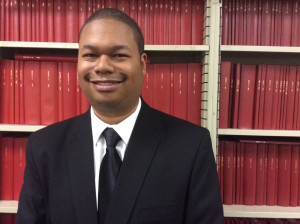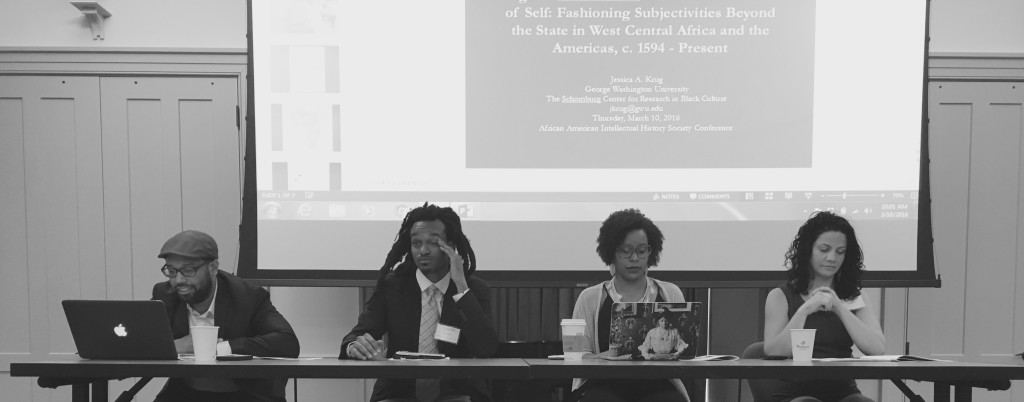Reflections on #AAIHS2016
 The following is a guest post from Robert Greene II, a Ph.D. candidate at the University of South Carolina. His research interests include the American South after 1945, American political and intellectual history, and African American history. Currently he is a blogger and book review editor for the Society of U.S. Intellectual Historians, and is working on a dissertation about the relationship between the national Democratic Party and African American voters in the South from 1965 until 1994. He has also had essays published in Dissent magazine, and at Politico and The Nation.
The following is a guest post from Robert Greene II, a Ph.D. candidate at the University of South Carolina. His research interests include the American South after 1945, American political and intellectual history, and African American history. Currently he is a blogger and book review editor for the Society of U.S. Intellectual Historians, and is working on a dissertation about the relationship between the national Democratic Party and African American voters in the South from 1965 until 1994. He has also had essays published in Dissent magazine, and at Politico and The Nation.
***
Last week’s African American Intellectual History Society conference, the first for the young organization, was a fascinating event showcasing current trends in African American intellectual history. My post will discuss some of the trends on display at the conference. In addition, I’ll touch on the importance of the conference itself. Finally, I shall close by thinking about where the conference is going next. In short, the AAIHS conference was a success on multiple levels, giving scholars a chance to talk about some exciting work that will revolutionize not just African American intellectual history, but the larger field of intellectual history itself.

Several trends stand out when one looks at the program for the conference. First, a transnational turn in African American intellectual history is apparent. This is not surprising—transnational history has long been an important part of African American history. Scholars of black history have insisted, since the dawn of African American history in the nineteenth century, on the importance of looking beyond borders to truly understand African American history. The African Diaspora had a constant presence at the conference. Panels such as “Radical Diasporas: Transnational Blackness, Pan-Africanism, and Liberated Spaces,” “Global Garveyism: From the Margins to the Center,” and “New Perspectives on Afro-Diasporic Thought and Praxis” all gave attention to studying African American intellectual history beyond the borders of the United States. A documentary screening of the film Audre Lorde—The Berlin Years, 1984-1992 opened up discussion of the raising of black consciousness among Afro-Germans.
A second trend is the continued digging into African American intellectual history before the twentieth century. I was pleased to see panel presentations such as “Intellectuals and the Work of Many Freedoms From the Antebellum to the Civil War Era” and “Nineteenth Century Black Political and Social Thought”. African American thought has never existed in a spatial or temporal vacuum. That is to say that as African American intellectuals have often shied away from just thinking within the contours of the United States, so have African American intellectuals avoided thinking merely of the here and now. History has provided them with the intellectual fuel to press on despite dire contemporary political and social conditions.

Space was also an important part of the conference, not just temporal or physical space, but the intellectual space of interdisciplinary work. “African American Education: Theory and Praxis,” a roundtable discussion on African American theology, “Space and Intellectual Movement Work in Black Nationalism,” and so much more highlighted this major theme. Thinking of intellectual history as a field that can benefit from interaction with philosophy, English, sociology, and other disciplines, was an important part of the African American Intellectual History Society conference. Mark Anthony Neal’s keynote address, “Love in the Stax: Black Nationalism and Rebuilding the Archive in Post-Apocalyptic Memphis” drove this point home. Finding intellectual history in African American music is another example of how space for intellectual historians can go beyond traditional archival sources.

I cannot say that I gave all the panels their due attention in this brief essay. However, such a conference as the AAIHS was a wonderful experience for everyone involved. In an era when discussions of “race” pervade national discourse, considering African American intellectual history is especially important—not just as an academic exercise, but as a public service. The panel I was part of, “#Blktwitterstorians and the Work of African American Intellectual History” drove home the importance of African American intellectual history to enriching the intellectual growth of activists for decades. Doing the panel alongside Middle Tennessee State’s Aleia Brown and Joshua Crutchfield, and chaired by Alcorn State professor Stephen G. Hall (author of this important book about nineteenth century African American intellectual history), it was a wonderful opportunity to talk about social media’s importance in breaking down barriers between historians, and between historians and the public. The #blktwitterstorians hashtag became the center of a larger discussion: what is the role of an African American historians in the twenty first century, in an “Age of Obama” that has mutated into the “Age of Black Lives Matter” and threatens to transform into a chaotic “Age of Trump”? We did not have a definitive answer—but that was precisely the point. The discussion we had during the roundtable discussion provided wonderful questions, and some potential answers.
It was a lively, and welcome, discussion about historians and the public that has long been a hallmark of the African American intellectual tradition. I am confident in saying that the conference in 2017, to be held in Nashville, Tennessee, will continue this tradition.
Copyright © AAIHS. May not be reprinted without permission.